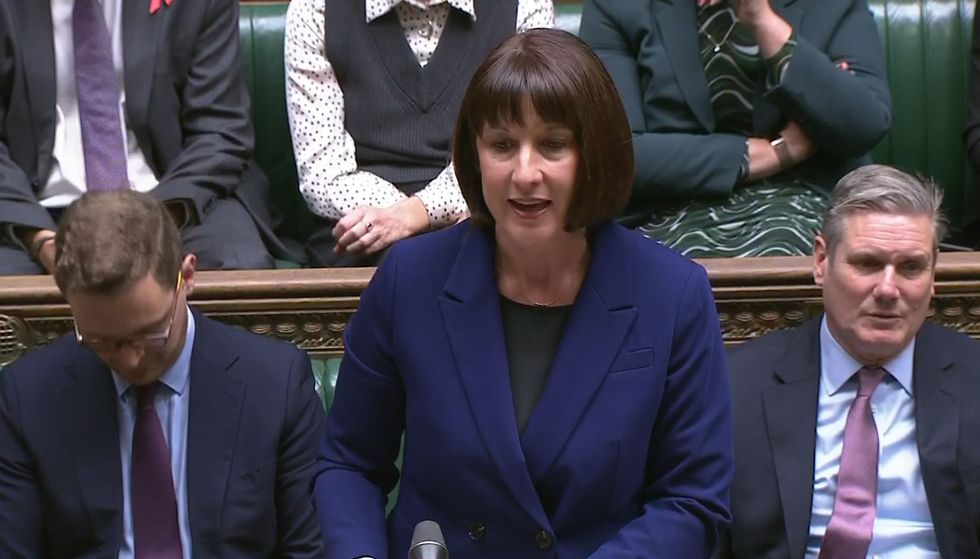Rishi Sunak can breathe a sigh of relief after today's Autumn Statement, which appears to have placated many Tory MPs in the party demanding tax cuts
PA
ERG Deputy Chairman David Jones told GB News MPs were 'reassured' but warned that MPs will need to see 'more' at the Spring Budget
Don't Miss
Most Read
Trending on GB News
Rishi Sunak can breathe a sigh of relief after today's Autumn Statement, which appears to have placated many Tory MPs in the party demanding tax cuts.
But he has been hit with a new deadline to make further cuts, with MPs already looking ahead to the Spring Budget.
European Research Group (ERG) Deputy Chairman David Jones told GB News he and his Conservative colleagues were "reassured" by today's announcements, but warned that MPs will need to see "more moves to a low tax economy at the Spring Budget".
Another Conservative insider with links to the ERG said today's announcement "buys the Prime Minister a bit of time", but they warned: "If polls don’t start to narrow slightly then I don’t think it will bring much reassurance".
WATCH: Jeremy Hunt says the Government wants to 'reward working people'
Sunak had been battling a revolt from his own MPs after increasing taxes at the previous budget. He has been accused of letting down 2019 voters by failing to pursue "conservative" policies - a criticism which only became louder after the Government's plan to send migrants to Rwanda was deemed unlawful by the Supreme Court.
Last week, Tory MP Andrea Jenkyns told GB News that she and six other MPs had sent in letters of no confidence in the wake of the Rwanda verdict.
Speaking after the verdict was delivered, a Conservative insider said that MPs would be looking ahead to the Autumn Statement to help them decide whether Sunak is the right person to take them forward to the next election.
But the announcement seems to have won over a number of MPs who seem to be placated by the long-awaited tax cuts.
MP Bob Seely agreed that his party would be "reassured" by the announcements, while former minister Tobias Ellwood threw his weight behind the statement, warning: "Anyone less than impressed is clearly spoiling for an unnecessary fight".
Looking ahead to next April, he said he is "sure" the opportunity to cut taxes further "will be seized" by the PM.
Tim Loughton, Conservative Member of Parliament for East Worthing and Shoreham, agreed, saying he is "content" with today's budget.
But taking a more reserved line on further tax cuts, Loughton told GB News the Government should only go further if "there is still financial headway".
Former Justice Secretary Robert Buckland took a similar line, praising the cuts as a "very big step forward", saying the Government should only cut taxes further "if there is the headroom to allow it".
Today's Autumn Statement saw Jeremy Hunt unveil a package of tax cuts, including a two per cent cut to employee National Insurance, while also cutting contributions for self-employed people.
Treasury Minister Bim Afolami suggested there will be more tax cuts on the cards in the Spring budget telling GB News after the budget the Government "hopes to return more of your hard-earned money to you".
The Chancellor also clamped down on benefit claimants and handed businesses the "biggest tax cut in modern British history" after he confirmed that full expensing for businesses will be made permanent.
Full expensing is a tax policy that allows businesses to fully deduct the cost of certain capital investments.
Former Prime Minister Liz Truss welcomed the move, saying it will increase growth by 1.6 per cent over 20 years.
In a statement on X, she added: "To increase growth more, Corporation Tax should be cut back to 19 per cent which would lead to 3.2 per cent more growth over 20 years.
"Let's make Great Britain grow again."
LATEST DEVELOPMENTS:

Rachel Reeves pointed out that taxes will be higher at the next election than they were at the last, telling the Commons that she has “long argued that taxes on working people are too high”
PA
But questions are still being asked over why the Government has not yet introduced proper tax cuts after the Office for Budget Responsibility revealed that the UK's tax burden is still on course to reach a post-Second World War high of 38 per cent of GDP.
“While personal and business tax cuts reduce the tax burden by half a percentage point, it still rises in each of the next five years to a post-war high of 38 per cent of GDP,” the OBR said.
Labour's Shadow Chancellor Rachel Reeves pointed out that taxes will be higher at the next election than they were at the last, telling the Commons that she has “long argued that taxes on working people are too high”.
The Shadow Chancellor also claimed that working people are “worse off” despite the Government’s promises.








